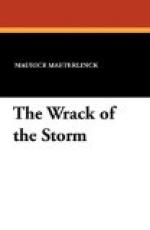Before closing this book, I wish to weigh for the last time in my conscience the words of hatred and malediction which it has made me speak in spite of myself. We have to do with the strangest of enemies. He has knowingly and deliberately, while in the full possession of his faculties and without necessity or excuse, revived all the crimes which we supposed to be forever buried in the barbarous past. He has trampled under foot all the precepts which man had so painfully won from the cruel darkness of his beginnings; he has violated all the laws of justice, humanity, loyalty and honour, from the highest, which are almost godlike, to the simplest, the most elementary, which still belong to the lower worlds. There is no longer any doubt on this point: it has been proved over and over again until we have attained a final certitude.
But on the other hand, it is no less certain that he has displayed virtues which it would be unworthy of us to deny; for we honour ourselves in recognizing the valour of those whom we are fighting. He has gone to his death in deep, compact, disciplined masses, with a blind, hopeless, obstinate heroism of which no such lurid example had ever yet been known, a heroism which has many times compelled our admiration and our pity. He has known how to sacrifice himself, with unprecedented and perhaps unequalled abnegation, to an idea which we know to be false, inhuman and even somewhat mean, but which he believes to be just and lofty; and a sacrifice of this kind, whatever its object, is always the proof of a force which survives those who devote themselves to making it and must command respect.
I know very well that this heroism is not like the heroism which we love. For us, heroism must before all be voluntary, freed from any constraint, active, ardent, eager and spontaneous; whereas with them it has mingled with it a great deal of servility, passiveness, sadness, gloomy, ignorant, massive submission and rather base fears. It is nevertheless the fact that, in the moment of supreme peril, little remains of all these distinctions and that no force in the world can drive to its death a people which does not bear within itself the strength to confront it. Our soldiers make no mistake upon this point. Question the men returning from the trenches: they detest the enemy, they abhor the aggressor, the unjust and arrogant aggressor, uncouth, too often cruel and treacherous; but they do not hate the man: they do him justice; they pity him; and, after the battle, in the defenceless wounded soldier or disarmed prisoner they recognize, with astonishment, a brother in misfortune who, like themselves, is submitting to duties and laws which, like themselves, he too believes lofty and necessary. Under the insufferable enemy they see an unhappy man who also is bearing the burden of life. They forget the things that divide them to recall only those which unite them in a common destiny; and they teach us a great lesson. Better than ourselves, who are




